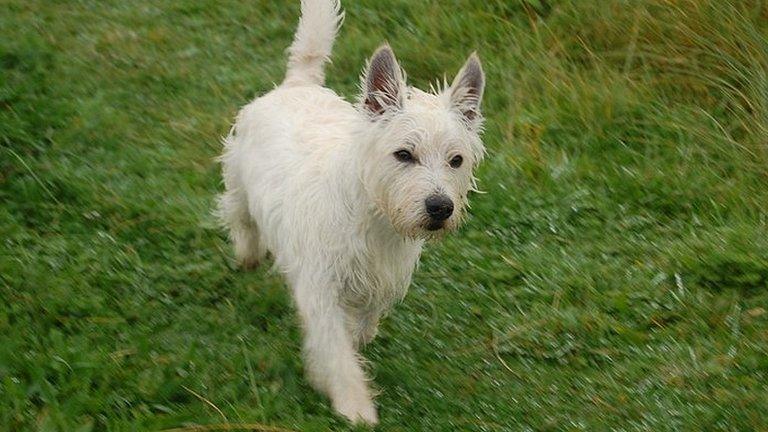Sherwood Forest: Warning over woodland dog illness
- Published

Frankie, a 17-month-old bitch, became ill after walking in woodland in Sherwood Forest
A dog owner whose pet became ill after walking in Sherwood Forest is warning people to watch for signs of a "mystery illness" that could kill their pets.
Seasonal Canine Illness (SCI) is associated with animals which have been walked in wooded areas or parkland in autumn months.
Cases are characterised by lethargy, vomiting and rapid unconsciousness.
The cause of the illness is still unconfirmed and needs further research, a veterinary charity, external has said.
Alex Windsor, from Kimberley, Nottingham, said her Cockapoo, Frankie, became extremely ill after visiting Sherwood Forest, external on Saturday.
She said Frankie had been agitated when they stopped to eat during the walk, but seemed fine after they set off again.
"We came down to let her out first thing Monday morning to find she had been sick and was very lethargic.
"She just got worse as the morning went on and started drooling at the mouth."
Dogs and mites
SCI has been causing dogs to become ill since 2009, with initial cases reported in Nottinghamshire, Lincolnshire and Warwickshire.
Twelve out of fifteen dogs affected that year died.
In 2010, the Forestry Commission received reports of two cases in Nottinghamshire and two in Lincolnshire. This time all four dogs survived.
More than 300 cases have been reported to the Animal Health Trust as part of a study into the cause of the illness.
In 2013, when the study concluded, there were 143 cases from across five study sites in Nottinghamshire and East Anglia.
Researchers said the cause of SCI remains a mystery but have since ruled out possible sources such as fungi, algae or agricultural chemicals.
The attention is now focused on harvest mites, which many ill dogs had been bitten by.
Tom Chalkley, from Lawrence Veterinary Centre in Eastwood, where Frankie is being treated, said although the cause is "quite poorly understood", prompt diagnosis and treatment meant the majority of dogs now survived.
- Published3 October 2013

- Published24 September 2010